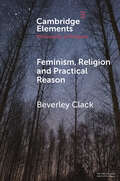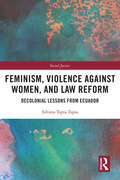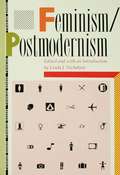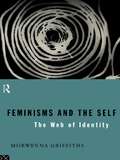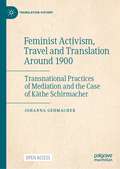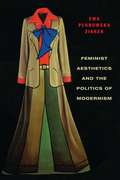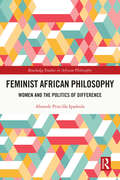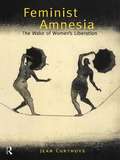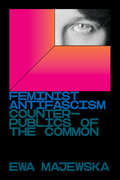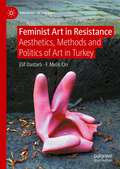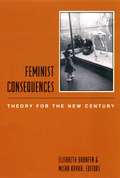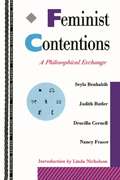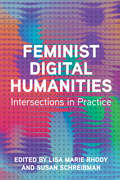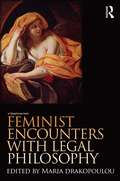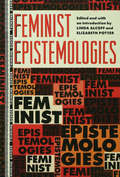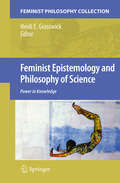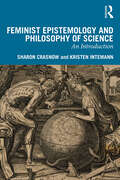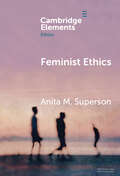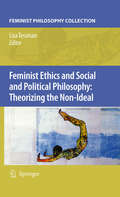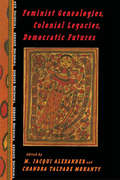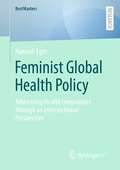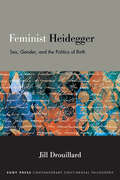- Table View
- List View
Feminism, Religion and Practical Reason (Elements in the Philosophy of Religion)
by Beverley ClackPamela Sue Anderson's A Feminist Philosophy of Religion (1998) and Grace Jantzen's Becoming Divine: Towards a Feminist Philosophy of Religion (1998) set the tone for subsequent feminist philosophies of religion. This Element builds upon the legacy of their investigations, revisiting and extending aspects of their work for a contemporary context struggling with the impact of 'post-truth' forms of politics. Reclaiming the power of collective action felt in religious community and the importance of the struggle for truth enables a changed perspective on the world, itself necessary to realise the feminist desire for more flourishing forms of life and relationship crucial to feminist philosophy of religion.
Feminism, Violence Against Women, and Law Reform: Decolonial Lessons from Ecuador (Social Justice)
by Silvana Tapia TapiaOffering an important addition to existing critiques of governance feminism and carceral expansion based mainly on experiences from the Global North, this book critically addresses feminist law reform on violence against women, from a decolonial perspective. Challenging the consensus that penal expansion is mainly associated with the co-option of feminist campaigns to counteract violence against women in the context of neoliberal globalisation, this book shows that long-standing colonial narratives underlie many of today’s dominant legal discourses justifying criminalisation, even in countries whose governments have called themselves "leftist" and "post-neoliberal". Mapping the history of law reform on violence against women in Ecuador, the book reveals how the conciliation between feminist campaigns and criminalisation strategies takes place through liberal legality, the language of human rights, and the discourse of constitutional guarantees, across the political spectrum. Whilst human rights make violence against women intelligible in mainstream legal terms, the book shows that the emergence of a "rights-based penality" produces a benign, formally innocuous criminal law, which can be presented as progressive, but in practice reproduces colonial and postcolonial paradigms that limit and reshape feminist demands. The book raises new questions on the complex social and political factors that impact on feminist law reform projects, as it demonstrates how colonial assumptions about gender, race, class, and the family remain embedded in liberal criminal law. This theoretically and empirically informed analysis makes an innovative contribution to feminist legal theory, post-colonial studies, and criminal law; and will be of interest to activists, scholars and policymakers working at the intersections between gender equality, law, and violence in Latin America and beyond.
Feminism/Postmodernism (Thinking Gender)
by Linda J. NicholsonIn this anthology, prominent contemporary theorists assess the benefits and dangers of postmodernism for feminist theory. The contributors examine the meaning of postmodernism both as a methodological position and a diagnosis of the times. They consider such issues as the nature of personal and social identity today, the political implications of recent aesthetic trends, and the consequences of changing work and family relations on women's lives. Contributors: Seyla Benhabib, Susan Bordo, Judith Butler, Christine Di Stefano, Jane Flax, Nancy Fraser, Donna Haraway, Sandra Harding, Nancy Hartsock, Andreas Huyssen, Linda J. Nicholson, Elspeth Probyn, Anna Yeatman, Iris Young.
Feminisms and the Self: The Web of Identity
by Morwenna GriffithsWhat does the politics of the self mean for a politics of liberation? Morwenna Griffiths argues that mainstream philosophy, particularly the anglo-analytic tradition, needs to tackle the issues of the self, identity, autonomy and self creation. Although identity has been a central concern of feminist thought it has in the main been excluded from philosophical analysis. Feminisms and the Self is both a critique and a construction of feminist philosophy. After the powerful challenges that postmodernism and poststructuralism posed to liberation movements like feminism, Griffiths book is an original and timely contribution to current debate surrounding the notion of identity and subjectivity.
Feminist Activism, Travel and Translation Around 1900: Transnational Practices of Mediation and the Case of Käthe Schirmacher (Translation History)
by Johanna GehmacherThis open access book takes the biographical case of German feminist Käthe Schirmacher (1865–1930), a multilingual translator, widely travelled writer of fiction and non-fiction, and a disputatious activist to examine the travel and translation of ideas between the women’s movements that emerged in many countries in the late 19th and early 20th century. It discusses practices such as translating, interpreting, and excerpting from journals and books that spawned and supported transnational civic spaces and develops a theoretical framework to analyse these practices. It examines translations of literary, scholarly and political texts and their contexts. The book will be of interest to academics as well as undergraduate and postgraduate students in the fields of modern history, women’s and gender history, cultural studies, transnational and transfer history, translation studies, history and theory of biography.
Feminist Aesthetics and the Politics of Modernism
by Ewa ZiarekEwa Ziarek fully articulates a feminist aesthetics, focusing on the struggle for freedom in women's literary and political modernism and the devastating impact of racist violence and sexism.
Feminist Aesthetics and the Politics of Modernism (Columbia Themes in Philosophy, Social Criticism, and the Arts)
by Ewa Płonowska ZiarekEwa Ziarek fully articulates a feminist aesthetics, focusing on the struggle for freedom in women's literary and political modernism and the devastating impact of racist violence and sexism. She examines the contradiction between women's transformative literary and political practices and the oppressive realities of racist violence and sexism, and she situates these tensions within the entrenched opposition between revolt and melancholia in studies of modernity and within the friction between material injuries and experimental aesthetic forms. Ziarek's political and aesthetic investigations concern the exclusion and destruction of women in politics and literary production and the transformation of this oppression into the inaugural possibilities of writing and action. Her study is one of the first to combine an in-depth engagement with philosophical aesthetics, especially the work of Theodor W. Adorno, with women's literary modernism, particularly the writing of Virginia Woolf and Nella Larsen, along with feminist theories on the politics of race and gender. By bringing seemingly apolitical, gender-neutral debates about modernism's experimental forms together with an analysis of violence and destroyed materialities, Ziarek challenges both the anti-aesthetic subordination of modern literature to its political uses and the appreciation of art's emancipatory potential at the expense of feminist and anti-racist political struggles.
Feminist African Philosophy: Women and the Politics of Difference (Routledge Studies in African Philosophy)
by Abosede Priscilla IpadeolaThe book argues that women's perspectives and gender issues must be mainstreamed across African philosophy in order for the discipline to truly represent the thoughts of Africans across the continent. African philosophy as an academic discipline emerged as a direct challenge to Western and Eurocentric hegemonies. It sought to actualize the project of decolonization and to contribute African perspectives to global discourses. There has, however, been a dominance of male perspectives in this field of human knowledge. This book argues that African philosophy cannot claim to have liberated people of African descent from marginalization until the androcentric nature of African philosophy is addressed. Key concepts such as Ujamaa, Negritude, Ubuntu, Consciencism, and African Socialism are explored as they relate to African women's lives or as models of inclusion or exclusion from politics. In addition to offering a feminist critique of African philosophy, the book also discusses topics that have been consistently overlooked in African philosophy. These topics include sex, sexuality, rape, motherhood, prostitution, and the low participation of women in politics. By highlighting the work of women feminist scholars such as Oyeronke Oyewumi, Nkiru Nzegwu, Ifi Amadiume, Amina Mama, and Bibi Bakare-Yusuf, the book engages with African philosophy from an African feminist viewpoint. This book will be an essential resource for students and researchers of African philosophy and gender studies.
Feminist Amnesia: The Wake of Women's Liberation
by Jean CurthoysFeminist Amnesia is an important challenge to contemporary academic feminism. Jean Curthoys argues that the intellectual decline of university arts education and the loss of a deep moral commitment in feminism are related phenomena. The contradiction set up by the radical ideas of the 1960s, and institutionalised life of many of its protagonists in the academy has produced a special kind of intellectual distortion. This book criticises current trends in feminist theory from the perspective of forgotten and allegedly outdated feminist ideas. Jean Curthroys show that much contemporary feminist theory, like much of today's radical thought, is muddled. The 'forgotten' theory of Women's Liberation was, she argues, deeply oppositional and moral. The repression of this theory has led to distortions, most notabley in the preoccupation with binary oppositions. Jean Curthoys argues that where Women's Liberation was once radical, much of contemporary feminist thought hides behind obscurantism, and has become conservative and orthodox. These controversial ideas will be keenly debated by all those involved in womens's studies, feminist theory and moral philosophy.
Feminist Antifascism: Counterpublics of the Common
by Ewa MajewskaFeminism as the bulwark against fascismIn this exciting, innovative work, Polish feminist philosopher Ewa Majewska proposes a specifically feminist politics of antifascism. Mixing theoretical discussion with engaging reflections on personal experiences, Majewska proposes what she calls “counterpublics of the common” and “weak resistance,” offering an alternative to heroic forms of subjectivity produced by neoliberal capitalism and contemporary fascism.
Feminist Art in Resistance: Aesthetics, Methods and Politics of Art in Turkey (Sociology of the Arts)
by F. Melis Cin Elif DastarlıThis book provides a thorough interdisciplinary analysis of the ways in which artists have engaged with political and feminist grassroots movements to characterise a new direction in the production of feminist art. The authors conceptualise feminist art in Turkey through the lens of feminist philosophy by offering a historical analysis of how feminism and art interacts, analysing emerging feminist artwork and exploring the ways in which feminist art as a form opens alternative political spaces of social collectivities and dissent, to address epistemic injustices. The book also explores how the global art and feminist movements (particularly in Europe) have manifested themselves in the art scenery of Turkey and argues that feminist art has transformed into a form of political and protest art which challenges the hegemonic masculinity dominating the aesthetic debates and political sphere. It is an invaluable reading for students and scholars of sociology of art, gender studies and political sociology.
Feminist Consequences: Theory for the New Century
by Elisabeth Bronfen Misha KavkaExploring the status of feminism in this "postfeminist" age, this sophisticated meditation on feminist thinking over the past three decades moves away from the all too common dependence on French theorists and male thinkers and instead builds on a wide-ranging body of feminist theory written by women. These writings address the question "Where are we going?" as well as "Where have we come from?" As evidenced in the essays compiled here, the multiplicity of directions available to this new feminism ranges from poststructuralist academic theory through cultural activism to re-readings of law, literature, and representation.
Feminist Consequences: Theory for the New Century (Gender and Culture Series)
by Misha Kavka Eds. Bronfen ElisabethExploring the status of feminism in this "postfeminist" age, this sophisticated meditation on feminist thinking over the past three decades moves away from the all too common dependence on French theorists and male thinkers and instead builds on a wide-ranging body of feminist theory written by women.These writings address the question "Where are we going?" as well as "Where have we come from?" As evidenced in the essays compiled here, the multiplicity of directions available to this new feminism ranges from poststructuralist academic theory through cultural activism to re-readings of law, literature, and representation. Contributors include Mieke Bal, Lauren Berlant, Rosi Braidotti, Elisabeth Bronfen, Judith Butler, Rey Chow, Drucilla Cornell, Ann Cvetkovich, Jane Gallop, Beatrice Hanssen, Claire Kahane, Ranjana Khanna, Biddy Martin, Juliet Mitchell, Anita Haya Patterson, and Valerie Smith.Feminist Consequences, representing the forefront of international feminist thought, marks a new and long-desired stage of feminist criticism where women are themselves making theory rather than reacting to male production.
Feminist Contentions: A Philosophical Exchange (Thinking Gender Ser.)
by Nancy FraserFirst published in 1995. Routledge is an imprint of Taylor and Francis, an informa company.
Feminist Digital Humanities: Intersections in Practice (Topics in the Digital Humanities)
by Susan Brown Susan Schreibman Laura Mandell Jacqueline Wernimont Nanna Bonde Thylstrup Kristin Veel Daniela Agostinho Astrid Von Rosen Monika Barget Ravynn K. Stringfield Tanya E. Clement Jaime Lee Kirtz Nikki L. Stevens Jenny Bergenmar Cecilia Lindhé Katrine Dirckinck-Holmfeld Mark Sample Lisa Marie Rhody Dhanashree Thorat Andie SilvaFeminist digital humanities offers opportunities for exploring, exposing, and revaluing marginalized forms of knowledge and enacting new processes for creating meaning. Lisa Marie Rhody and Susan Schreibman present essays that explore digital humanities practice as rich terrain for feminist creativity and critique. The editors divide the works into three categories. In the first section, contributors offer readings that demonstrate how feminist thought can be put into operation through digital practice or via analytical approaches, methodologies, and interpretations. A second section structured around infrastructure considers how technologies of knowledge creation, publication, access, and sharing can be formed or reformed through feminist values. The final section focuses on pedagogies and proposes feminist strategies for preparing students to become critical and confident readers with and against technologies. Aimed at readers in and out of the classroom, Feminist Digital Humanities reveals the many ways scholars have pushed beyond critique to practice digital humanities in new ways. Contributors: Daniela Agostinho, Monika Barget, Jenny Bergenmar, Susan Brown, Tanya E Clement, Katrine Dirckinck-Holmfeld, Jaime Lee Kirtz, Cecilia Lindhé, Laura Mandell, Lisa Marie Rhody, Mark Sample, Susan Schreibman, Andie Silva, Nikki L. Stevens, Ravynn K. Stringfield, Dhanashree Thorat, Nanna Bonde Thylstrup, Kristin Veel, Astrid von Rosen, and Jacqueline Wernimont
Feminist Encounters with Legal Philosophy
by Maria DrakopoulouPresenting feminist readings of texts from the legal philosophical and jurisprudential canon, the papers collected here offer an interdisciplinary and critical challenge to established modes of reading law. Feminist approaches to law usually take the form of either critical engagements with legal doctrine, legal concepts and ideas, or critical assessments of the effects that specific areas of law have upon the lives of women. This collection, however, although rooted in feminist legal scholarship, takes the established canon of legal texts as the object of inquiry. Taking as their common starting point the fact that legal texts are plural and open to multiple readings, all the contributions in this collection offer subversive, but supplementary, interpretations of the legal canon. In this respect, however, they do not merely sustain an array of feminist styles and theories of reading; revealing and re-appropriating the plural space of legal interpretation, they seek to open a hitherto unexplored arena for a feminist politics of law. Feminist Encounters with Legal Philosophy is a thoroughly researched interdisciplinary collection that will interest students and scholars of Law, Philosophy, and Feminism.
Feminist Epistemologies (Thinking Gender)
by Elizabeth Potter Linda AlcoffFirst published in 1993. Routledge is an imprint of Taylor & Francis, an informa company.
Feminist Epistemologies (Thinking Gender)
by Linda Alcoff and Elizabeth PotterThis is the first collection by influential feminist theorists to focus on the heart of traditional epistemology, dealing with such issues as the nature of knowledge and objectivity from a gender perspective.
Feminist Epistemology and Philosophy of Science
by Heidi E. GrasswickHaving enjoyed more than twenty years of development, feminist epistemology and philosophy of science are now thriving fields of inquiry, offering current scholars a rich tradition from which to draw. In addition to a recognition of the power of knowledge itself and its effects on women's lives, a central feature of feminist epistemology and philosophy of science has been the attention they draw to the role of power dynamics within knowledge-seeking practices and the implications of these dynamics for our understandings of knowledge, science, and epistemology. Feminist Epistemology and Philosophy of Science: Power in Knowledge collects new works that address today's key challenges for a power-sensitive feminist approach to questions of knowledge and scientific practice. The essays build upon established work in feminist epistemology and philosophy of science, offering new developments in the fields, and representing the broad array of the feminist work now being done and the many ways in which feminists incorporate power dynamics into their analyses.
Feminist Epistemology and Philosophy of Science: An Introduction
by Sharon Crasnow Kristen IntemannFeminist Epistemology and Philosophy of Science: An Introduction is structured around six questions and the answers to them that have been offered by feminist epistemologists and philosophers of science. By showing how these answers differ from those of traditional philosophical approaches, the book situates feminist work in relation to philosophy more generally.The questions are: Who knows? What do we have knowledge of? How do we know? What don’t we know? Why does it matter? and How can we know better? In addressing these questions, the book reviews feminist accounts of objectivity, agnotology, issues in social epistemology--including epistemic injustice--and considers how feminist epistemology and philosophy of science aim at better knowledge production. The audience for the book is upper division undergraduates, but it will be useful as a foundation for graduate students and other philosophers who are seeking a general understanding of feminist work in these areas.Key Features: Provides an overview of contemporary feminist epistemology and philosophy of science Contrasts feminist epistemology and philosophy of science with traditional philosophy in these areas Provides clear examples of the benefits of feminist approaches Includes in each chapter an initial overview and, at the end of the chapter, suggested additional readings and discussion questions
Feminist Ethics (Elements in Ethics)
by Anita M. SupersonFeminist Ethics provides an overview of feminist contributions to normative ethics, moral psychology, and metaethics. It argues that through their criticisms of traditional ethics and proposals for changes, feminists are advancing 'robust agency,' an account of ideal moral and rational agency that promises to give us better responses than those given in traditional ethics to problems in ethics, including how we know our duties, the kind of persons we should strive to become, and why we should act morally.
Feminist Ethics and Social and Political Philosophy: Theorizing the Non-Ideal
by Lisa TessmanFeminist Ethics and Social and Political Philosophy: Theorizing the Non-Ideal is a collection of feminist essays that self-consciously develop non-idealizing approaches to either ethics or social and political philosophy (or both). Characterizing feminist ethics and social and political philosophy as marked by a tendency to be non-idealizing serves to thematize the volume, while still allowing the essays to be diverse enough to constitute a representation of current work in the fields of feminist ethics and social and political philosophy. Each of the essays either serves as an instance of work that is rooted in actual, non-ideal conditions, and that, as such, is able to consider any of the many questions relevant to subordinated people; or reflects theoretically on the significance of non-idealizing as an approach to feminist ethics or social and political philosophy. The volume will be of interest to feminist scholars from all disciplines, to academics who are ethicists and political philosophers as well as to graduate students.
Feminist Genealogies, Colonial Legacies, Democratic Futures (Thinking Gender)
by Chandra Talpade Mohanty M. Jacqui AlexanderFeminist Geneaologies, Colonial Legacies, Democratic Futures provides a feminist anaylsis of the questions of sexual and gender politics, economic and cultural marginality, and anti-racist and anti-colonial practices both in the "West" and in the "Third World." This collection, edited by Jacqui Alexander and Chandra Talpade Mohanty, charts the underlying theoretical perspectives and organization practices of the different varieties of feminism that take on questions of colonialism, imperialism, and the repressive rule of colonial, post-colonial and advanced capitalist nation-states. It provides a comparative, relational, historically grounded conception of feminist praxis that differs markedly from the liberal pluralist, multicultural understanding that sheapes some of the dominant version of Euro-American feminism. As a whole, the collection poses a unique challenge to the naturalization of gender based in the experiences, histories and practices of Euro-American women.
Feminist Global Health Policy: Addressing Health Inequalities through an Intersectional Perspective (BestMasters)
by Hannah EgerHealth inequalities, primarily driven by the structural determinants of health, are a major concern towards the global goal of health for all. A feminist global health policy has the potential to address the unequal distribution of power and to dismantle these imbalances. The prioritisation of intersectional, holistic, human rights-based approaches intends to advance health equality and reproductive justice. This research examined the contours and potentials of a feminist global health policy by developing a framework. Online focus groups were conducted with participants affiliated to either the global-academic or local-activist level, envisaging global representation. The elaborated framework provides a nexus between the global and the local level, by entailing universal principles as well as recommendations and sensitivity for context-specific adaptations. Community and policymakers are identified as key actors. This research aims to stimulate a debate on feminist global health policy and the potential of this framework with regard to health equality and reproductive justice.
Feminist Heidegger: Sex, Gender, and the Politics of Birth (SUNY series in Contemporary Continental Philosophy)
by Jill DrouillardA feminist reading of how Heidegger may have responded to an unanswered questioned he posed in 1923, "Problem: What is woman?" while using his thought to better understand how contemporary society replies to questions in the realms of law, bioethics, pedagogy, and politics.This book begins with an unexplored and unanswered question that Martin Heidegger raises in a 1923 Freiburg course: "Problem: What is woman?" Yet, why should we care that Heidegger raises this "problem"? What could he, a member of the National Socialist Party, help feminists understand about responding to "the woman question"? How can Heidegger help us understand our own historical climate in which this question continues to hold significance? Jill Drouillard divides Heidegger's thought into two categories to think about the sexed/gendered experiences that coordinate our birth: (1) the one that suspends "the woman question" and that provides useful resources for thinking the fluidity of sex/gender, and (2) the one that provides a totalized reply to this query by manipulating tropes of the feminine to advance a politico-poetic project of Nazi politics. She uses Heidegger as a cautionary tale to demonstrate the harm that occurs when society tries to define the being (or "what is") of woman in any definite sense. In some chapters, she teases apart how Heidegger may have offered a reply to "the woman question" and, in others, shows what happens in today's society when law, bioethics, politics, and pedagogy reckon with this query.
